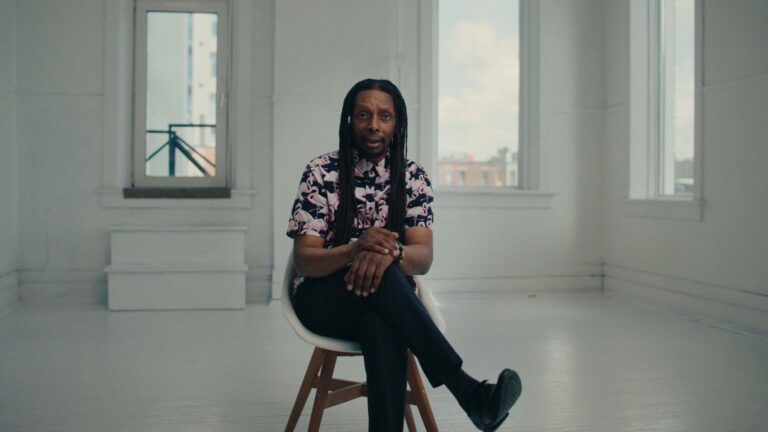Musicians dream of performing in front of an adoring crowd, winning industry awards and enjoying all the perks of being a star. But what would you do if you reached the top and then realized it was not what you thought it would be?
That is the question asked in Temple of Love: The Erroll Starr Story, a short documentary film from local filmmakers Kyle Sawyer and Katie Billo and Vintage Black Canada creator Aaron Francis. The short documentary chronicles the rise to fame and sudden departure of Canadian musical icon Erroll Starr.
Born Erroll Starr Francis, Starr was part of a large family of musicians. When he was two, the family immigrated to England before moving again to settle in Canada. In the documentary, Starr shared how his father bought him a guitar, which led to his love of performing.
“After three or four months, he came by and heard me play and said, ‘Hey, you’re really good. Do you want to join my band?’” Starr said in the documentary.
From that moment, Starr said he was hooked. The film then follows Starr’s rise from his time as a “hired gun” frontman for the band Harbinger to finding success and fame as a solo artist with hits like “For the Love of Money” and “Holding Out for You.” In 1989, Starr won the Juno Award for R&B/Soul Recording of the Year for his single “Angel”.
While it appeared that he was finding success in the industry, Starr was struggling to earn a living as a musician. At the time, R&B and dance music were not given the same radio air time—especially tracks from Black musicians.
Music producer Mark Berry said the lack of commercial radio airplay impacted Starr’s ability to gain a larger audience.
“How do you have a hit? Personally, I feel he didn’t get the recognition that I felt he deserved. I mean, here’s this great R&B voice. Right. And because he’s in Canada, which at the time was completely dominated by rock bands, where do you put him? Is there even a radio station to play him,” Berry said.
One of the only ways for Starr to build his audience and earn a living was in dance clubs, where he said there were not enough dates to be successful. But while Starr could be seen on TV as a rich musician living a luxurious lifestyle, that was far from his financial reality.
“You see that in some people’s minds, that I was becoming a big star, right? That’s kind of the illusion of media. You’re told this, and because it’s on TV or wherever you believe it,” Starr said. “You go out there and do your thing, and then it’s back to my rental apartment. That happened for some time, and it started to sort of grate on my soul,” he said.
It was around this time that Starr began to rethink his life.
“At that time in the industry, and everybody knows it, cocaine was rampant…In my own stupidity or lack of self-awareness, I fell into that hole. And then I felt it was time for me to get out. And nobody wanted me to get out because that would stop the gravy train. I needed to get out,” Starr said.
Telling Starr’s story is personal for Francis, the son of Starr’s sister, Angelina. Francis heard Starr’s story growing up and said he was inspired to share it while working on the Vintage Black Canada project, which tells the story of the African diaspora in Canada through family photographs. Many of the photographs come from Francis’ personal collection.
“My uncle encouraged me to make it happen, and then I met Kyle and Katie through a mutual friend, and they had a ton of ideas about it,” Francis said.
Sawyer and Billo are the owners of the Kitchener-based film production company Digital Sabbath. The duo had recently completed a short documentary series on local businesses during the pandemic called Business Unusual, and Sawyer said they wanted to jump back in on another short documentary film.
“Aaron already had the idea of making a film that was from Errol’s story, which Aaron had a ton of media on. When he approached us, we were just hungry to do stuff and we wanted to tell these types of stories. We had a call with Errol that was supposed to be half an hour. He ended up telling us his entire story over the phone. After that, we knew we had to tell this man’s story,” Sawyer said.
The film has a running time of 18 minutes, which is classified as a short documentary—or short doc. Francis said the format gave them the ability to tell Starr’s story as a succinct narrative.
“We could talk about all kinds of stuff, but we wanted to find that narrative thread. We were either going to make it less than 30 minutes, or it was going to be an hour or more. Those are two different things entirely,” Francis said.
The film had its Canadian premiere at the Toronto Black Film Festival on February 18 and will premiere in the US at the Seattle Black Film Festival in April. Billo, the film’s producer, added that the short doc format also works as a proof of concept to gain interest in producing a longer version of Starr’s story.
“Making a feature would have taken a ton more time, money, and resources. Now that we have this short doc, it is like a calling card to be like, ‘Well, this is what we could do with this one thing in 18 minutes.’ It opens doors,” Billo said.
Temple of Love: The Erroll Starr Story will screen at the Grand River Black Music Festival on Friday, June 14, 2024. Errol Starr will also return to the stage during the festival for a performance at the Kitchener Public Library the same day.

